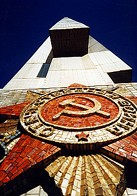For almost three years, Belarus has been subject to a secret presidential decree. The decree has never been published or shown to the media, though it defines, in particular, which journalists can report on Lukašenka and in which way they can do so.
Foreign journalists accredited by Belarus's foreign ministry are often barred from events in which the President takes part. The lucky exception is a small group of Russian correspondents in Miensk representing the three leading TV companies (ORT, RTR and NTV) and the three news agencies (ITAR-TASS, RIA Novosti and Interfax), as well as a Reuters reporter. Other journalists, including those from Poland, Latvia and Ukraine, have to watch the single Belarusian state-run TV channel to get the official news and quotes from Lukašenka.
No permanent accreditation
There is no such thing in Belarus as permanent accreditation with the President or his administration, while the Law on Press guarantees every medium the right to accredit its correspondents with any state body. Independent and foreign journalists have to apply for each event to be included on the presidential press list, in most cases only to be told they are not allowed to come. Why?
The answer was at long last given by Lukašenka's press service chief, Źmicier Žuk. He made public a one-page excerpt from Lukašenka's secret decree No 19 dated 12 January 1998. The Presidential Library does not possess such a document in its database, and the printed presidential bulletin contains two decrees of 12 January 1998, but only Nos 18 and 20. The secret decree's part sent by Žuk is Chapter 4, titled "Coverage in the media of the events where the President of the Republic of Belarus takes part."
Clause 4.1 reads that Lukašenka's speeches "are published in full in the Sovietskaya Byelorussia and other national newspapers. The newspapers' editors-in-chiefs have personal responsibility for the authenticity of those speeches."
Clause 4.3 reads: "The press service of the President of the Republic of Belarus passes on the speeches of the President of the Republic of Belarus, as well as other official materials, to foreign information agencies." Yet the Associated Press or Agence France Press have yet to recieve any such documents.
The last time he spoke
The last news conference given by Lukašenka in Miensk where independent journalists were allowed was held on 5 May 1998, four months after the secret decree had been signed. Lukašenka reinstated the Fifth of May, the birthday of Russian Communist newspaper Pravda and the USSR's official Press Day, as a holiday for Belarusian journalists. The news conference was held during the CIS Journalists Congress, and Lukašenka was asked why foreign journalists in Miensk were not allowed access to him.
"If there really is lack of information—I am ready... Perhaps it is also my fault that the system for the President to communicate with journalists still does not exist. Do you know why? Not only Paškievič is guilty, journalists are also guilty, especially Jakubovič," Lukašenka replied in May 1998—having signed in January 1998 the secret decree which did set up the system of his communication for journalists, including even with the official presidential daily Sovietskaya Byelorussia's editor-in-chief Paval Jakubovič.
Ivan Paškievič, former deputy chief of the presidential administration, now says he is unfamiliar with the secret decree. He also said all acts dealing with rights of journalists should be published. Paškievič, who currently is a member of Belarus's National Assembly (the Parliament created by Lukašenka), vowed to investigate the secret decree. Andrej Bastuniec, vice-president of the Belarusian Association of Journalists, commented that a certain act could be published only if it does not concern human rights.

|
"This decree, it seems to me, does touch the rights of journalists," Bastuniec said. "I was more interested in clause 4.5, which reads that the personal composition of journalists and photo reporters needed for media coverage of the events with Belarus's President is defined by the presidential press service and security service. I view this as violation of journalists' rights."
Lukašenka's decree No 19 also reads in clause 4.4: "Media representatives who cover the events held with the President of the Republic of Belarus fulfill their duties in accordance with the order defined by the press service of the President of the Republic of Belarus and the Security Service."
So, it seems Lukašenka runs a sort of Press Security Service. Or, at least, nobody in official Miensk has admitted or denied the secret presidential decree that confirms such a thought.
Yuri Svirko, 27 November 2000
photo by Howard Jarvis
Moving on:
- Archive of Belarusian news reviews
- Archive of articles on Belarus in CER
- Browse through the CER eBookstore for electronic books
- Buy English-language books on Central and Eastern Europe through CER
- Return to CER front page



